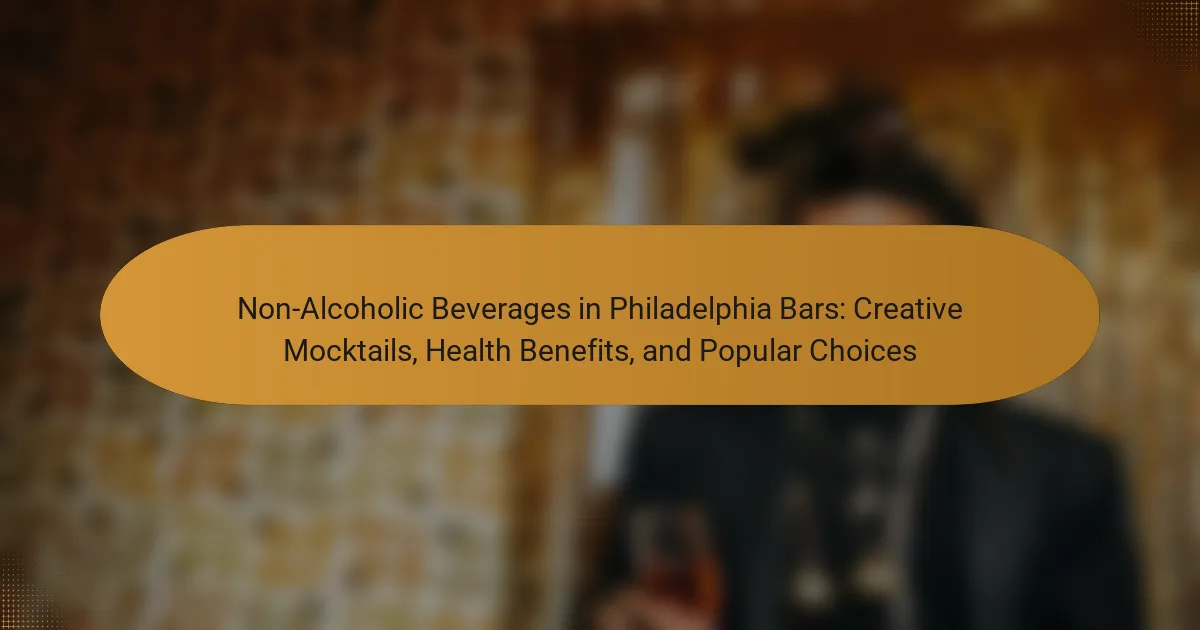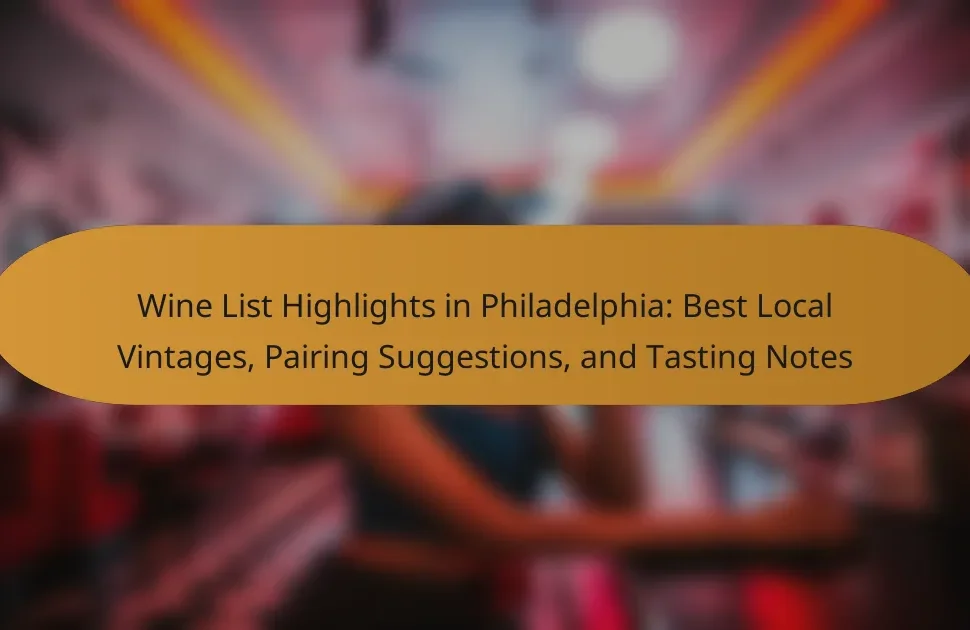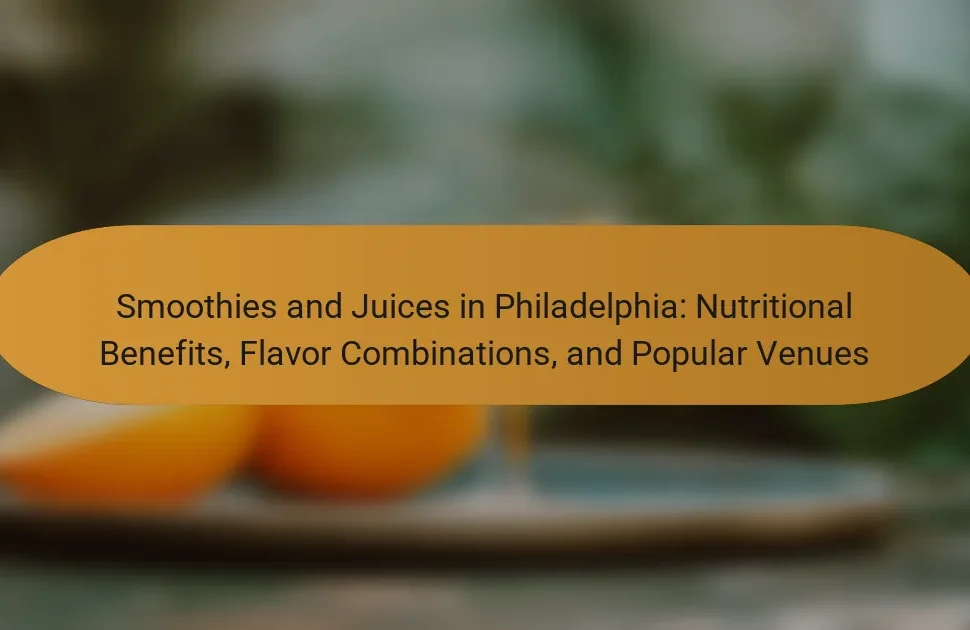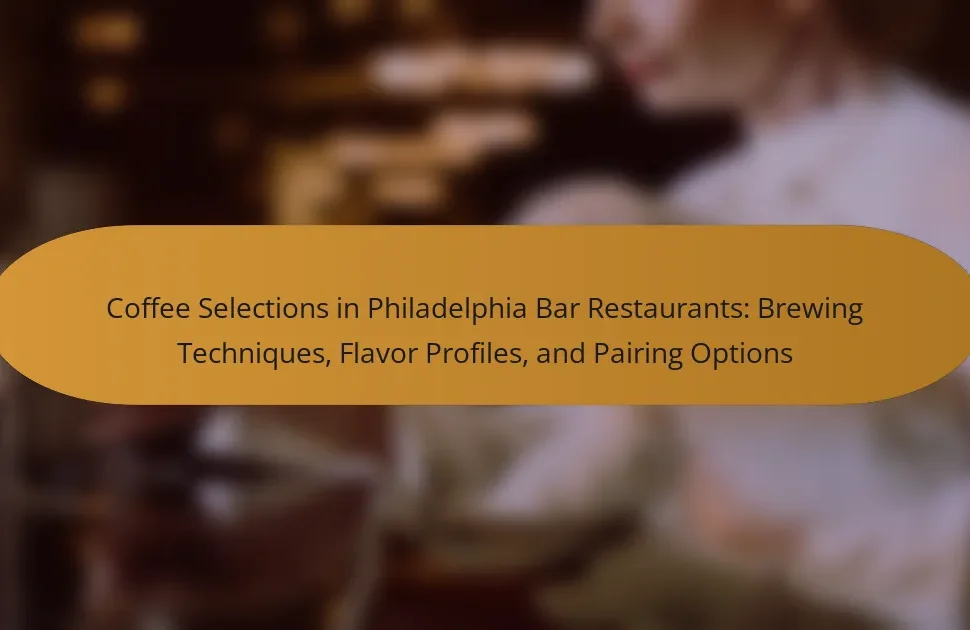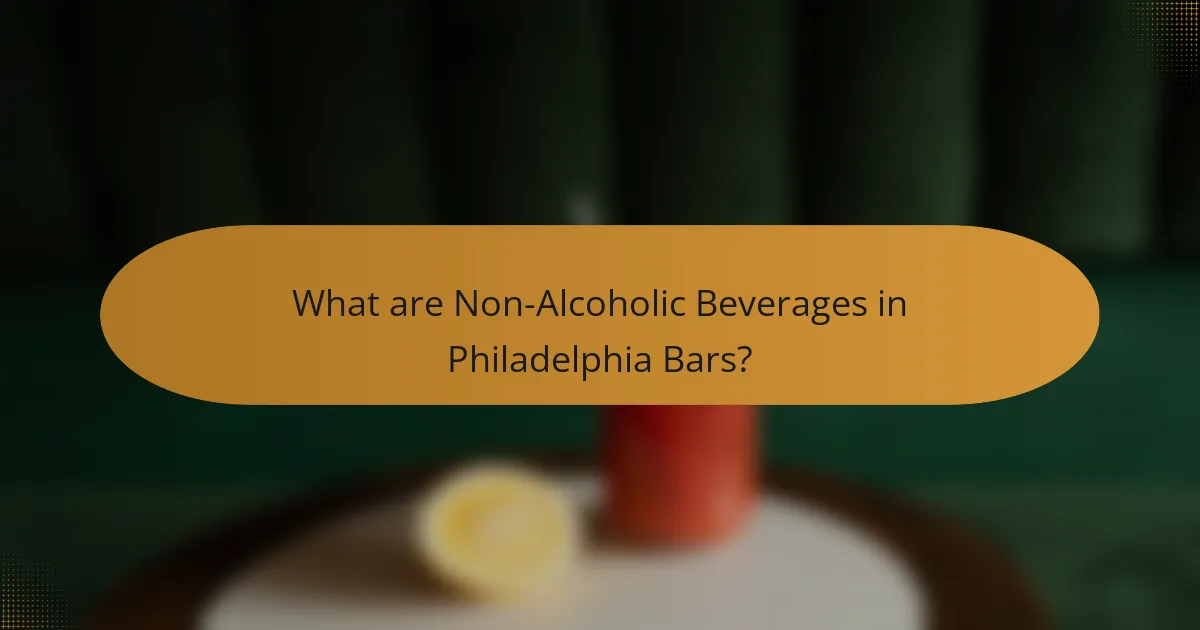
What are Non-Alcoholic Beverages in Philadelphia Bars?
Non-alcoholic beverages in Philadelphia bars include a variety of drinks that do not contain alcohol. These beverages often consist of mocktails, sodas, juices, and flavored waters. Many bars offer creative mocktails that mimic traditional cocktails but use non-alcoholic ingredients. Popular choices include sparkling water with fruit infusions and herbal teas. Health-conscious options are also available, such as kombucha and non-alcoholic beers. The increasing demand for non-alcoholic options reflects a shift in consumer preferences. According to industry reports, non-alcoholic beverage sales have grown significantly in recent years, indicating their rising popularity in social settings.
How do Non-Alcoholic Beverages differ from traditional alcoholic options?
Non-alcoholic beverages differ from traditional alcoholic options primarily in their alcohol content. Non-alcoholic beverages typically contain less than 0.5% alcohol by volume, while traditional alcoholic drinks contain higher levels, often ranging from 4% to 12% or more. This difference affects the physiological effects on the body. Non-alcoholic options do not impair motor skills or cognitive functions like alcoholic beverages can. Additionally, non-alcoholic beverages often provide a wider variety of flavors and ingredients, appealing to those seeking healthier choices. Many non-alcoholic drinks are crafted with fresh fruits, herbs, and spices, enhancing their nutritional value. The growing trend toward non-alcoholic options reflects changing consumer preferences for wellness and moderation.
What types of Non-Alcoholic Beverages are commonly offered in Philadelphia bars?
Philadelphia bars commonly offer a variety of non-alcoholic beverages. These include soft drinks like cola and lemon-lime soda. Iced tea and lemonade are also popular choices. Many bars feature mocktails, which are non-alcoholic versions of classic cocktails. Sparkling water and flavored seltzers are frequently available. Coffee and herbal teas cater to those seeking warm options. Additionally, some establishments provide non-alcoholic beers and wines. These offerings reflect a growing trend towards inclusive beverage options in the city’s bar scene.
How are Non-Alcoholic Beverages prepared and served?
Non-alcoholic beverages are prepared by combining various ingredients without alcohol. Common methods include mixing juices, sodas, and flavored syrups. Ingredients are often shaken or stirred with ice for a refreshing effect. Garnishes like fruit slices or herbs are added for visual appeal and flavor enhancement.
These beverages are typically served in a glass, often over ice. Presentation can include decorative elements like straws or cocktail umbrellas. The serving temperature is usually cold, enhancing the drinking experience.
In Philadelphia bars, creative mocktails are popular, showcasing unique flavor combinations. Many establishments focus on health benefits, using fresh ingredients and natural sweeteners. This approach caters to diverse consumer preferences, making non-alcoholic options appealing.
Why is the popularity of Non-Alcoholic Beverages increasing in Philadelphia?
The popularity of non-alcoholic beverages is increasing in Philadelphia due to a growing health consciousness among residents. Many people are seeking healthier lifestyle choices, leading to a demand for alternatives to alcoholic drinks. This shift is reflected in the rise of creative mocktails and innovative non-alcoholic options in local bars. A survey by the National Institute on Alcohol Abuse and Alcoholism indicates that 30% of adults are reducing their alcohol intake. Additionally, social trends show that younger generations prioritize wellness, influencing their beverage choices. As a result, bars are adapting their menus to cater to this increasing demand for non-alcoholic beverages.
What cultural or social trends are influencing this increase?
The rise in popularity of non-alcoholic beverages in Philadelphia bars is influenced by several cultural and social trends. Increasing health consciousness among consumers is a primary factor. Many individuals are prioritizing wellness and seeking healthier lifestyle choices. This shift has led to a demand for lower-calorie and non-alcoholic options. Additionally, the trend of mindfulness and moderation is gaining traction. People are becoming more aware of their drinking habits and opting for alternatives that allow socializing without intoxication. The growing acceptance of sober-curious lifestyles is also significant. This movement encourages individuals to explore sobriety without stigma. Furthermore, the influence of social media plays a role. Platforms showcase creative mocktails, making them appealing and trendy. These trends collectively contribute to the increase in non-alcoholic beverage offerings in bars.
How do consumer preferences impact the offerings in bars?
Consumer preferences significantly shape the offerings in bars. Bars adapt their menus based on what customers desire. For instance, the rise in health consciousness has led to an increase in non-alcoholic options. A study by the National Institute on Alcohol Abuse and Alcoholism indicates that 30% of adults are reducing alcohol consumption. This shift prompts bars to create innovative mocktails and healthier beverage choices. Additionally, trends such as sustainability influence ingredient sourcing. Bars that align with consumer preferences tend to attract more patrons and enhance customer satisfaction.
What role do Non-Alcoholic Beverages play in social settings?
Non-alcoholic beverages serve as inclusive options in social settings. They allow individuals who do not consume alcohol to participate fully. These beverages promote social interaction and connection without the effects of alcohol. Research indicates that 63% of adults enjoy non-alcoholic options at social gatherings. Non-alcoholic drinks can enhance the overall experience by providing variety and flavor. They also support health-conscious choices among attendees. This inclusion fosters a welcoming atmosphere for everyone, regardless of their drinking preferences.
How do they contribute to inclusivity in social gatherings?
Non-alcoholic beverages contribute to inclusivity in social gatherings by providing options for individuals who do not consume alcohol. They allow everyone to participate in social events without feeling excluded. Mocktails and other non-alcoholic drinks cater to diverse preferences and dietary restrictions. This promotes a welcoming environment for designated drivers, pregnant individuals, and those recovering from addiction. According to a study by the National Institute on Alcohol Abuse and Alcoholism, 30% of adults in the U.S. do not drink alcohol. Offering non-alcoholic options acknowledges this demographic and enhances social interaction.
What are the benefits of choosing Non-Alcoholic Beverages for socializing?
Choosing non-alcoholic beverages for socializing promotes inclusivity and health. Non-alcoholic options allow everyone to participate without pressure to consume alcohol. They can reduce the risk of negative health effects associated with drinking, such as impaired judgment and hangovers. Studies show that non-alcoholic beverages can still provide a social experience similar to alcoholic drinks. They often come in creative flavors, enhancing the enjoyment of social gatherings. Additionally, opting for non-alcoholic drinks can lead to better hydration and overall wellness. According to the National Institute on Alcohol Abuse and Alcoholism, non-drinkers can maintain clearer thinking and better emotional regulation in social situations.
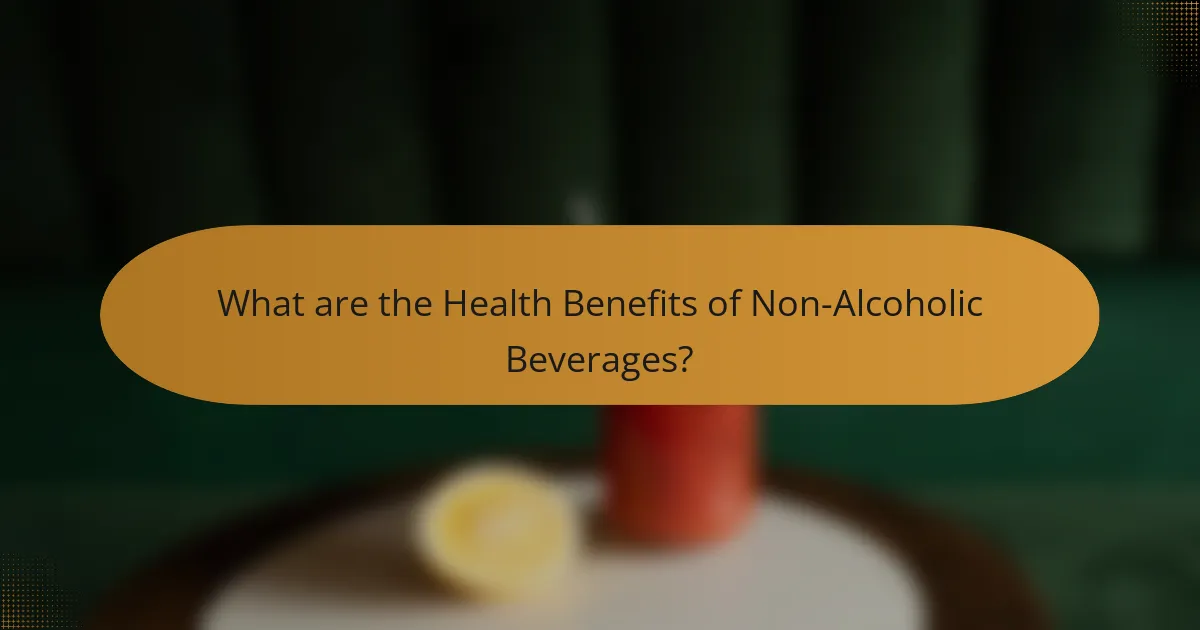
What are the Health Benefits of Non-Alcoholic Beverages?
Non-alcoholic beverages offer various health benefits. They are often lower in calories compared to alcoholic drinks. This can aid in weight management. Many non-alcoholic options are rich in vitamins and antioxidants. For example, fruit juices provide essential nutrients. Herbal teas can promote hydration and relaxation. Additionally, non-alcoholic beverages do not impair cognitive function. This allows for better decision-making and social interactions. Studies show that choosing non-alcoholic drinks can reduce the risk of alcohol-related health issues.
How do Non-Alcoholic Beverages promote better health compared to alcoholic drinks?
Non-alcoholic beverages promote better health compared to alcoholic drinks by reducing the risk of alcohol-related health issues. Alcohol consumption is linked to liver disease, certain cancers, and cardiovascular problems. In contrast, non-alcoholic options often contain fewer calories and no added sugars, aiding in weight management. Many non-alcoholic beverages are rich in vitamins and antioxidants, which support overall health. For example, herbal teas and fresh juices can boost immunity and hydration. Studies indicate that people who choose non-alcoholic drinks experience lower rates of anxiety and depression. Additionally, non-alcoholic beverages can enhance social interactions without the negative effects of alcohol.
What nutritional values do Non-Alcoholic Beverages typically provide?
Non-alcoholic beverages typically provide hydration, vitamins, minerals, and antioxidants. For example, fruit juices can offer vitamin C and potassium. Herbal teas may contain antioxidants that support overall health. Sparkling waters often have added minerals like magnesium and calcium. Many non-alcoholic drinks are low in calories, making them a lighter choice. Some options, like smoothies, can provide dietary fiber and protein. Overall, these beverages can contribute to daily nutrient intake while promoting hydration.
How can Non-Alcoholic Beverages support hydration and wellness?
Non-alcoholic beverages support hydration and wellness by providing essential fluids without the dehydrating effects of alcohol. These drinks, such as water, herbal teas, and fruit-infused beverages, contribute to daily fluid intake. Staying hydrated is crucial for maintaining bodily functions, including temperature regulation and nutrient transport. Research indicates that proper hydration can enhance cognitive performance and physical endurance. Additionally, many non-alcoholic options contain vitamins and antioxidants, promoting overall health. For instance, beverages like coconut water are rich in electrolytes, aiding in hydration. Overall, non-alcoholic beverages serve as beneficial alternatives for hydration and wellness.
What specific health benefits can be associated with popular mocktails?
Popular mocktails can provide several health benefits. They often contain fresh fruits and herbs, which are rich in vitamins and antioxidants. For example, citrus mocktails are high in vitamin C, boosting the immune system. Herbal ingredients like mint and basil can aid digestion and provide anti-inflammatory properties. Many mocktails use sparkling water, which can help with hydration without added sugars. Additionally, mocktails can be lower in calories than alcoholic beverages, making them a healthier choice for those managing weight. Overall, choosing mocktails can support a healthier lifestyle while still offering enjoyable flavors.
Which ingredients in mocktails contribute to health benefits?
Citrus fruits, herbs, and spices in mocktails contribute to health benefits. Citrus fruits like lemon and lime provide vitamin C, which boosts the immune system. Herbs such as mint and basil contain antioxidants that can reduce inflammation. Spices like ginger and turmeric have anti-inflammatory properties and can aid digestion. Additionally, ingredients like berries are rich in antioxidants, which help combat oxidative stress. These components not only enhance flavor but also promote overall wellness.
How can mocktails be tailored for specific dietary needs?
Mocktails can be tailored for specific dietary needs by adjusting ingredients to meet health requirements. For example, sugar-free sweeteners can replace traditional sugars for those managing diabetes. Gluten-free spirits or mixers can be used for individuals with gluten intolerance. Fresh fruits and herbs can enhance flavor while keeping calories low for weight management. Non-dairy alternatives can be included for lactose intolerance. Low-sodium mixers can cater to those on sodium-restricted diets. Additionally, mocktails can be crafted to be low in calories, using fresh juices and sparkling water instead of high-calorie mixers. This customization ensures that mocktails remain enjoyable while accommodating various dietary restrictions.
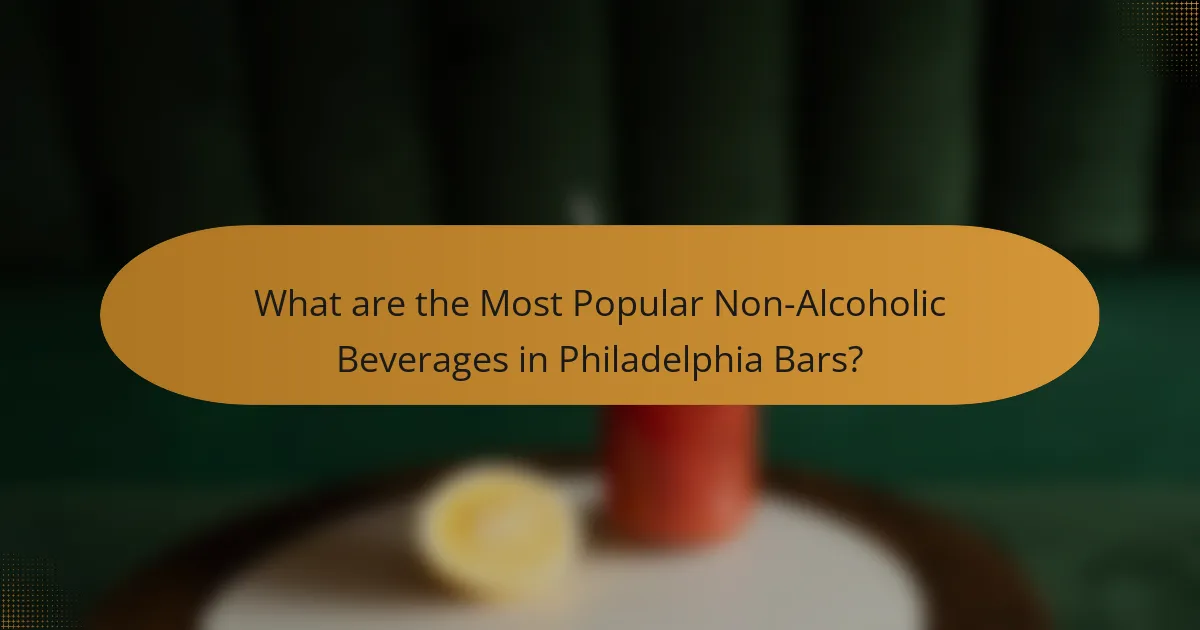
What are the Most Popular Non-Alcoholic Beverages in Philadelphia Bars?
The most popular non-alcoholic beverages in Philadelphia bars include mocktails, soda, and iced tea. Mocktails are creatively crafted drinks that mimic cocktails without alcohol. Popular choices often feature fresh ingredients like herbs and fruits. Sodas are a staple, with establishments offering various brands and flavors. Iced tea, both sweetened and unsweetened, is frequently ordered. Lemonade is also a common refreshing option. Many bars have begun to include non-alcoholic beers and spirits in their menus. This trend reflects a growing demand for inclusive beverage options.
What are some creative mocktail recipes popular in Philadelphia bars?
Philadelphia bars are known for their creative mocktail recipes. One popular option is the “Cucumber Mint Cooler.” This drink combines fresh cucumber, mint leaves, lime juice, and soda water. Another favorite is the “Spicy Mango Mule,” featuring mango puree, ginger beer, and jalapeño slices. The “Berry Basil Smash” is also a hit, made with muddled berries, basil, and lemon juice. Additionally, the “Peach Iced Tea Spritzer” blends peach puree with iced tea and sparkling water. These mocktails highlight local ingredients and innovative flavor combinations, making them standout choices in Philadelphia’s vibrant bar scene.
How do local ingredients influence mocktail creations?
Local ingredients significantly influence mocktail creations by enhancing flavor profiles and promoting regional identity. Utilizing fresh, locally sourced fruits and herbs can elevate the taste and authenticity of mocktails. For instance, Philadelphia bars may incorporate local citrus fruits or seasonal produce to create unique combinations. This practice not only supports local farmers but also ensures freshness in every drink. Additionally, local ingredients often reflect the cultural heritage of the area, making mocktails more relatable to patrons. The use of such ingredients can lead to innovative recipes that resonate with the community. As a result, mocktails become a canvas for showcasing local flavors and creativity.
What are the signature mocktails offered by top bars in Philadelphia?
Top bars in Philadelphia offer a variety of signature mocktails. Popular choices include the “Cucumber Cooler,” made with fresh cucumber and mint. Another favorite is the “Spicy Paloma,” featuring grapefruit and jalapeño. The “Tropical Fizz” combines pineapple and coconut for a refreshing taste. Additionally, the “Berry Smash” incorporates mixed berries and basil. These mocktails provide flavorful alternatives to traditional cocktails. They cater to non-drinkers while ensuring a vibrant bar experience.
How do Non-Alcoholic Beverages cater to different taste preferences?
Non-alcoholic beverages cater to different taste preferences by offering a variety of flavors and ingredients. They include fruity, herbal, and spicy options to appeal to diverse palates. For instance, mocktails can incorporate fresh fruits, herbs, and spices. This variety allows for sweetness, tartness, and bitterness in drinks. Additionally, non-alcoholic beers and wines provide familiar tastes for those who enjoy traditional beverages. The rise of craft non-alcoholic drinks has expanded choices significantly. Many bars now create unique blends to satisfy specific cravings. This customization ensures that everyone can find a beverage that suits their taste.
What flavor profiles are most sought after in mocktails?
Citrus, herbal, and fruity flavor profiles are most sought after in mocktails. Citrus flavors like lime and lemon provide freshness and brightness. Herbal notes from ingredients like mint or basil add complexity and depth. Fruity profiles often include berries, tropical fruits, and stone fruits for sweetness. These combinations create refreshing and enjoyable drinks. According to a survey by the Beverage Marketing Corporation, citrus and fruit flavors are consistently popular in non-alcoholic beverages. This trend reflects consumer preferences for vibrant, flavorful options without alcohol.
How can bartenders create unique Non-Alcoholic experiences for patrons?
Bartenders can create unique non-alcoholic experiences for patrons by crafting innovative mocktails. They should use fresh ingredients like herbs, fruits, and spices to enhance flavors. Incorporating unique mixers, such as flavored syrups or artisanal sodas, adds depth. Bartenders can also experiment with presentation, using garnishes and creative glassware. Offering tastings or flights of different mocktails can engage patrons. Additionally, themed nights focusing on specific ingredients can attract interest. Providing educational elements about the benefits of non-alcoholic beverages can enhance the experience. Research indicates that the demand for non-alcoholic options is rising, with 27% of consumers actively seeking these choices.
What are some tips for enjoying Non-Alcoholic Beverages in bars?
Choose a variety of non-alcoholic beverages to explore different flavors. Many bars now offer creative mocktails that mimic traditional cocktails. Ask the bartender for recommendations based on your taste preferences. Experiment with different mixers, such as tonic water, soda, or fresh juices. Consider ordering non-alcoholic beer or wine for a familiar experience. Enjoy the ambiance and social aspect of the bar without the alcohol. Bring friends along to share the experience and make it more enjoyable. Remember to stay hydrated by alternating non-alcoholic drinks with water.
Non-alcoholic beverages in Philadelphia bars encompass a diverse range of drinks, including mocktails, sodas, juices, and flavored waters, reflecting a growing consumer preference for healthier options. These beverages typically contain less than 0.5% alcohol by volume and offer unique flavors and ingredients that appeal to health-conscious individuals. The article explores the types, preparation methods, and health benefits of non-alcoholic drinks, highlighting their role in promoting inclusivity in social settings. Additionally, it discusses popular mocktail recipes, the influence of local ingredients, and consumer trends driving the demand for non-alcoholic options in Philadelphia’s vibrant bar scene.
